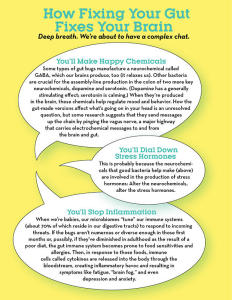
At the Brain Bio Center, a nonprofit clinic run by FoodfortheBrain.org to help people use nutrition, diet, and lifestyle recommendations to assist mental health conditions, the specialists say that poor blood sugar is often the single biggest factor in mood disorders among the people who seek their advice. In their article on depression, they write:
“Eating lots of sugar is going to give you sudden peaks and troughs in the amount of glucose in your blood; symptoms that this is going on include fatigue, irritability, dizziness, insomnia, excessive sweating (especially at night), poor concentration and forgetfulness, excessive thirst, depression and crying spells, digestive disturbances and blurred vision. Since the brain depends on an even supply of glucose it is no surprise to find that sugar has been implicated in aggressive behavior, anxiety, and depression, and fatigue.”
When our blood sugar levels are balanced our moods are better stabilized, our energy is sustained for longer periods of time and less of an energy spike and crash, along with a reduction of inflammation throughout the body.
Fish Oil– Consuming plenty of omega-3 fatty acids may offer powerful protection against depression. A large Norwegian study of nearly 22,000 participants revealed that those who regularly took cod liver oil, which is rich in omega-3 fatty acids, were about 30% less likely to have symptoms of depression than those who did not. The longer the participants took cod liver oil, the less likely they were to have high levels of depression.2
Omega-3 fatty acids may also help improve mood in those who already suffer from depression. In a recent study at the Royal College of Surgeons in Ireland, the effect of omega-3 fatty acid supplementation was studied in 49 patients with repeated episodes of harming themselves. In addition to standard psychiatric care, study subjects were randomly assigned to receive 1200 mg EPA plus 900 mg DHA, or placebo, for 12 weeks. At the end of the treatment period, the group receiving omega-3 fatty acids had significantly greater improvements compared with the placebo group in scores for depression, suicidality and daily stresses.5
Furthermore, other studies suggest that people who are still depressed despite use of antidepressant medications may have reduced intensity of depression, anxiety, sleep disturbances, and sexual dysfunction when supplementing with omega-3 fatty acids.3,4
How Omega-3s Fight Depression
Scientists are intensely examining how omega-3 fatty acids work to promote a healthy mood.
A new study sought to shed some light on how omega-3 fatty acid deficiency may aggravate depressed mood. Researchers looked at plasma levels of essential fatty acids and neurosteroids, which are neuroactive chemicals implicated in several neurophysical and disease processes. Study subjects included 18 healthy men and 34 men with alcoholism, depression, or both. In the group of all 52 subjects, lower level of omega-3 essential fatty acids was associated with higher levels of neuroactive steroids.
 |
It appears that a lack of DHA has far-reaching hormonal effects, increasing corticotropin-releasing hormone, a hormone that moderates emotionality. This may in turn contribute to hyperactivity within the hypothalamic pituitary adrenal (HPA) axis, an important neuroendocrine system that regulates mood, aggression and “fight-or-flight” responses associated with anxiety.
“The [evidence] is becoming quite compelling that increasing omega-3 fatty intake enhances many aspects of brain function, including the control of mood and aspects of personality,” Brian M. Ross, MD, Associate Professor of Medicine, Chemistry and Public Health at the Northern Ontario School of Medicine of Lakehead University, tells Life Extension. “For example, combining the results of a series of clinical trials clearly shows that supplementation with omega-3 fatty acids, in particular the long- chain varieties EPA and DHA, helps reduce the symptoms associated with clinical depression. Other provocative data suggest that boosting omega-3 fatty acid intake increases attention and reduces aggression, probably by enhancing cognitive processes.”
According to a hypothesis recently presented by Dr. Ross, deficiency of omega-3 fatty acids in major depressive disorder may reflect the interaction between a diet lacking these essential polyunsaturated fatty acids (PUFAs), and a genetically determined abnormality in their metabolism, such that cellular uptake of omega-3 PUFAs is decreased. Low level of omega-3 fatty acids could thus be is a risk factor for depression, while dietary supplementation with omega-3 fatty acids might be a useful and well-tolerated treatment for major depressive disorder.
Given that brain tissue is rich in omega-3 fatty acids, particularly in the membranes of three different types of brain cells, this link between omega-3 fatty acids and brain health is hardly surprising. These essential fatty acids are required for proper growth, development, and function of brain tissue.
The human brain is 60% fat, and omega-3 fatty acids are the fatty acid of choice for the structure of certain parts of brain cell membranes and brain intercellula. Consequently, Lack of dietary omega-3 forces the brain cells to utilize other fatty acids on hand, resulting in cells constructed with inferior building material,” Dr. London says. “Lack of available omega-3s affects brain function and is associated with cognitive and emotional disorders. There is growing evidence that a significant proportion of the US population is at risk for omega-3 fatty acid deficiency.” http://www.lifeextension.com/magazine/2007/10/report_depression/Page-01
In North America today, the average daily intake of EPA plus DHA is only 130 mg, falling far short of the daily 1000-2000 mg total omega-3 fatty acids recommended by some clinicians for optimal health, mood, and cognitive function. Based on clinical trials, dosages of 1000-4000 mg may offer maximal benefits for those with depressed mood.
Although the precise mechanism of action is still unknown, accumulating evidence suggests that 1000-2000 mg daily of EPA may be useful in the treatment of mild to moderate depression,” Dr. Yamina Osher, lead author of a recent review of 12 clinical trials of PUFAs in depression, bipolar disorder, and other mood disorders27 and a member of the Faculty of Health Sciences at Ben Gurion University in Beer Sheva, Israel, tells Life Extension.
Probiotics– One of the hottest and fascinating of research is the connection between gut bacteria and mental health. In fact, the brain and gut are so tightly wired together that scientists and others refer to the gut as the second brain. Researchers at Canada’s McMaster University transferred gut bacteria from gregarious mice into timid, fearful mice, who—lo and behold—became much bolder. In another experiment, rat pups with high levels of stress hormones after being separated from their mothers, calmed down after being fed probiotic bacteria commonly found in yogurt. [Gut] bacteria are mind-altering microorganisms,” says Mark Lyte, a microbiome researcher at Texas Tech. Science is adding a whole new dimension to the old line, “You are what you eat.” Similarly a study done by a gastroenterologist at UCLA showed the effects of probiotics and the brain. Twice a day for 4 weeks, she fed a group of 12 women a yogurt specially blended with live probiotic bacteria and compared their performance on a test with that of a group who had eaten a dairy product that contained no probiotics. Both groups aced the test, but in the women who hadn’t been on the probiotic-yogurt regimen, parts of the brain associated with hyperalertness and anxiety lit up more strongly on an fMRI imaging study.
Vitamin D– According to the CDC, in 2006 a whopping one fourth of the population was deficient in vitamin D. Eight percent were “at risk” for vitamin D deficiency illnesses and one percent had levels that were considered imminently harmful. According to Natural News, vitamin D is “perhaps the single most underrated nutrient in the world of nutrition.” Recent studies by Springer, and research results reported in the New England Journal of Medicine and by the Vitamin D Council, are indicating a link to depression. Of note: Canadian researchers reviewed 14 studies, consisting of 31,424 participants and found a strong correlation between depression and a lack of Vitamin D. The lower the Vitamin D level, the greater the chance of depression. But, the big question is still causality. Does one get depressed because of a deficiency of Vitamin D, or does depression lower the vitamin level?
Another extremely promising small test was conducted on three severely depressed women, ages 42 to 66; all with a vitamin D deficiency. For 12 weeks they were given oral Vitamin D supplements, bringing their levels to normal. All three reported feeling much better and markedly less depressed.
Research has shown that the connection between vitamin D and depression relief is linked to the D3 form – the same form of vitamin D that is obtained through sunlight. Scientists have found that people with the lowest levels of vitamin D were 11 times more prone to be depressed than those who had normal levels. Vitamin D deficiency is actually more the norm than the exception, and has previously been implicated in both psychiatric and neurological disorders. Why? There are vitamin D receptors in the brain, and the vitamin may affect proteins in the brain known to play a role in mood, learning and memory, motor control, and possibly even maternal and social behavior.
Whey– Whey is commonly thought of by the public to be a muscle-building protein used by athletes and bodybuilders seeking to build muscle and improve physique and athletic performance. However, this is only one of whey’s many physiological purposes. Some research studies suggest that whey protein, especially its main active component Alpha-lactalbumin, may help reduce levels of cortisol while simultaneously increasing production of serotonin.
To assess whether or not whey protein contributed to suppression of cortisol levels, a group of Dutch researchers led by C. B. Markus performed a double-blind study comparing a sample size of 23 “stress-vulnerable” subjects with high levels of salivary cortisol (sampled via saliva) with 29 “relatively stress-invulnerable” subjects with low levels of salivary cortisol. The researchers also documented that the stress-vulnerable population had relatively high levels of fatigue, anger, and tension while the stress-invulnerable population has relatively low levels of these stress-associated symptoms. The researchers set up both subject groups with nutritionally identical diets – except they provided casein-protein to the “low-stress” individuals and whey-derived protein to the “high-stress” individuals.
The researchers based their intervention on the fact that whey protein’s primary active ingredient — Alpha-lactalbumin — consists of a high ratio of the amino acid trypotophan (trp) in relation to other large neutral amino acids. As previously stated this ratio, which is often denoted as “the plasma Trp-LNAA ratio”, is considered to be an indirect indication of increased production of serotonin by the brain and decreased cortisol levels. Therefore, the researchers hypothesized that by adding increased Alpha-lactalbumin to the diets of the high-stress individuals, they would increase their plasma Trp-LNAA ratio and subsquently lower cortisol levels while simultaneously increasing levels of Serotonin. This would ultimately lead to lower depressive symptoms in the stress-vulnerable population.
In the stress-vulnerable group fed the whey-derived Alpha-lactalbumin diet, the ratio of plasma tryptophan to other amino acids was 48% higher than in those on the casein diet (Markus, 1048). In stress-vulnerable subjects, this was accompanied by a decrease in cortisol levels and fewer feelings of depression and anxiety which are associated with higher levels of serotonin.
In contrast, the less stress-vulnerable population who did not consume Alpha-lactalbumin experienced no significant changes in levels of serotonin, cortisol, or stress-associated indicators. Because of these findings, the investigators concluded that the results “suggest that enhancing the tryptophan availability in the brain leads to a clear effect on performance, although only in stress-vulnerable individuals” (Markus, 1055). Given these interesting findings, many other researchers became curious to assess whey’s ability to help individuals cope with stress-related symptoms by increasing the trp-LNAA ratio and subsequently reducing Cortisol levels and increasing levels of serotonin.
Vitamins Minerals and Micro Nutrients–
Micro nutrients such as vitamins, minerals, amino acids and essential fatty acids are the building blocks of the brain and body.
In 2009, a randomized placebo controlled study using minerals and vitamins, also known collectively as micro nutrients, for the treatment of ADHD in adults. This study was published in the British Journal of Psychiatry. Within an 8 week period, twice as many people responded within the micro nutrient group compared to placebo. Twice as many people went into remission in their depression in the micro nutrient group, hyper activity and impassivity in the normal non clinical range, and those who were taking the micro nutrients were more to report that their ADHD symptoms were less impairing and less interfering than people who were on the placebo. One year Later, those people who stayed on the micro nutrients maintained their changes, and showed further improvement, and those who switched to medications or stopped the micro nutrients saw a worsening of their symptoms.
When referring to micro nutrients, a dose higher than what you get at a vitamin pill purchased at a super market. In the study, participants received up to 15 pills a day with 36 nutrients. It is likely that if you went and got an over the counter supplement, you would unlikely see these benefits both because the dose is lower and the breadth of nutrients is lower.
Similarly, getting inadequate amounts of vitamins B6 and B12 is linked to higher incidents of depression. According to a study published in the August 2010 issue of the American Journal of Clinical Nutrition Researchers who analyzed data collected from more than 3,000 adults age 65 or older who participated in the Chicago Health and Aging Project found that those who had higher total intakes of vitamin B6 and B12 from foods and supplements were less likely to have depression. “Both of these vitamins are essential for the creation of neurotransmitters such as dopamine and serotonin, which are chemicals that are known to affect mood,” says Amy Taylor, MPH, RD, CDN, a dietitian at the Weill Cornell Medical Center. “A deficiency of either could inhibit the production of these neurotransmitters.”
Exercise/Physical activity– Professors from the University of Toronto have analyzed and compiled over 26 years of scientific research which concludes that even moderate levels of physical activity can help ward off depression in people of all ages.
Professors from the University of Toronto have analyzed and compiled over 26 years of scientific research which concludes that even moderate levels of physical activity can help ward off depression in people of all ages.
University of Toronto PhD candidate George Mammeh co-authored a review of 25 different research articles which showed that moderate exercise can prevent episodes of depression in the long term. This compilation of research has been published in the American Journal of Preventative medicine.
Our bodies and minds are hardwired to feel good when we work out. This is a generous biological design but also necessary for our survival. Everything humans need to survive—food, water, sleep, social connections, sexual contact, breathing deeply, and physically working our bodies (sweating)—are all designed to release a cascade of rewarding neuro chemicals that send us coming back for more. The University of Toronto review examined whether physical activity is protective against the onset of depression by compiling massive amounts of previous data. Their comprehensive search was conducted up until December 2012 in the following databases: MEDLINE, Embase, PubMed, PsycINFO, SPORTDiscus, and Cochrane Database of Systematic Reviews.
The studies concluded that moderate exercise could replace costly medications that come with many side effects. From a public health perspective, promoting physical activity is a valuable mental health strategy. Promoting exercise could reduce the risk of Americans developing depression en masse and reduce depression’s personal, social, and economic repercussions. George Mammen’s findings come at a time when mental health experts are looking for ways to treat depression without costly prescription medication. He says, “We need a prevention strategy now more than ever. Our health system is taxed. We need to shift focus and look for ways to fend off depression from the start.” Mammen concludes that the scope of research over the past 26 years confirms that regardless of individual predispositions, that moderate exercise not only treats, but can prevent depression. “It’s definitely worth taking note that if you’re currently active, you should sustain it. If you’re not physically active, you should initiate the habit. This review shows promising evidence that the impact of being active goes far beyond the physical.”
1. Nieminen LR, Makino KK, Mehta N, et al. Relationship between omega-3 fatty acids and plasma neuroactive steroids in alcoholism, depression and controls. Prostaglandins Leukot Essent Fatty Acids. 2006 Oct;75(4-5):309-14.
2. Ross BM. Omega-3 fatty acid deficiency in major depressive disorder is caused by the interaction between diet and a genetically determined abnormality in phospholipid metabolism. Med Hypotheses. 2007;68(3):515-24.
3. Bourre JM. Effects of nutrients (in food) on the structure and function of the nervous system: update on dietary requirements for brain. Part 2: macronutrients. J Nutr Health Aging. 2006 Sep;10(5):386-99.
4. Logan AC. Omega-3 fatty acids and major depression: a primer for the mental health professional. Lipids Health Dis. 2004 Nov 9;325.
5. Influence of vitamin D status and vitamin D3 supplementation on genome wide expression of white blood cells: a randomized double-blind clinical trial. http://www.ncbi.nlm.nih.gov/pubmed/23527013
6. American Journal of Geriatric Psychiatry, December 2006; 14(12): 1032-1040.
7. https://www.psychologytoday.com/blog/the-athletes-way/201310/25-studies-confirm-exercise-prevents-depression
8. http://www.health.harvard.edu/mind-and-mood/yoga-for-anxiety-and-depression




I came across your natural approach to depression website and wanted to let you know that we have decided to open our POWERFUL and PRIVATE web traffic system to the public for a limited time! You can sign up for our targeted traffic network with a free trial as we make this offer available again. If you need targeted traffic that is interested in your subject matter or products start your free trial today: http://pzr.eu/17 Unsubscribe here: http://gd.is/y/mun53